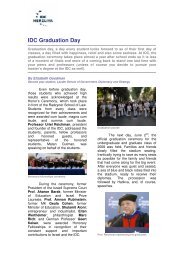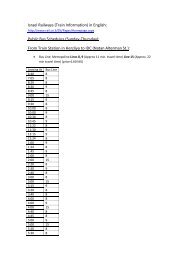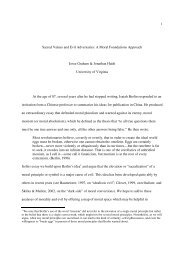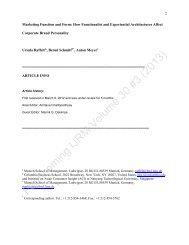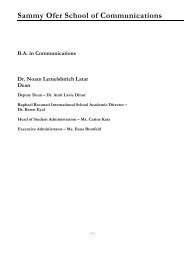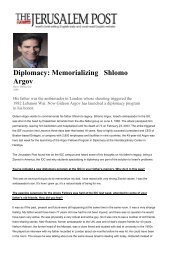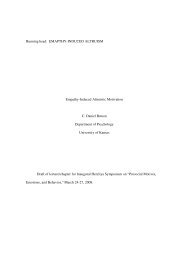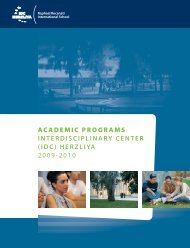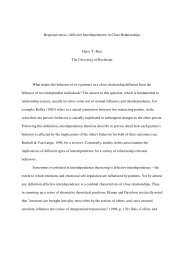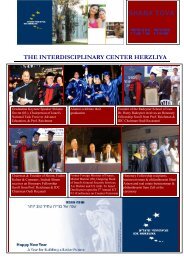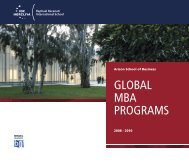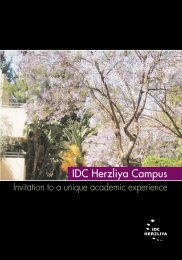The IDC
The IDC
The IDC
Create successful ePaper yourself
Turn your PDF publications into a flip-book with our unique Google optimized e-Paper software.
In addition to these students, there are also already third year Law students,<br />
who despite still having a year of study to go, already have internships.<br />
For example, Tomer Marsha, a Law and Business student, will do his<br />
internship at Bank Hapoalim in Tel Aviv in 2010 and Worknesh Redai,<br />
also a Law and Government student, is already doing a pre-internship in<br />
Tel Aviv University’s civil rights department.<br />
For all these students, their one-stop and all-encompassing friend,<br />
confidante and advisor on campus is their very dedicated coordinator,<br />
Ester David. She exudes warmth and positivity and the students well<br />
understand that she respects them and will do “everything and anything<br />
for them” as long as she has their dedication, respect and trust in return.<br />
“I try to constantly nourish them with positive feedback, but if they do<br />
something that they shouldn’t, or don’t do something that they should,<br />
all hell breaks loose,” says David. For her, their wellbeing in all areas is<br />
a priority, for “a relaxed student will do better at school” and when this<br />
exists, she knows that they will respond favorably to her constant focus on<br />
“excellence, excellence, excellence.”<br />
According to David, who has been the program’s coordinator since<br />
January 2007, “the aim of our program is to create a generation of young,<br />
ambitious leaders within society and to give them the tools and education<br />
“WE ARE TRULY INDEBTED<br />
TO THE DONORS WHO MAKE IT<br />
POSSIBLE FOR THIS PROGRAM TO<br />
CONTINUE AND GROW”<br />
- Jonathan Davis, <strong>IDC</strong> Vice President of External Relations<br />
Yonit Tapeta, 3rd year Communications student, holding the INJERA<br />
(traditional Ethiopian bread)<br />
feAtures / ethiopian scholarship Program<br />
“THERE IS NO SPECIAL FORMULA OR<br />
MAGIC POTION OR MIRACLE. AS MUCH<br />
EFFORT AS THEY PUT IN WILL BE AS<br />
MUCH AS THEY GET OUT”<br />
- Ester David, <strong>IDC</strong> Ethiopian Scholarship Program coordinator<br />
Joey Low, founder of the Israel<br />
at Heart program, received an<br />
Honorary Fellowship from <strong>IDC</strong> in<br />
2006 to highlight his tremendous<br />
efforts for the sake of Ethiopian<br />
youth in Israel. Here he is seen with<br />
Jonathan Davis, <strong>IDC</strong> Vice President<br />
of External Relations<br />
to make a real change.” She notes that<br />
this is the first generation of Ethiopians<br />
who are able to network and break<br />
all the previous barriers facing their<br />
community – including lack of self<br />
confidence, education and social<br />
connections.<br />
“It’s amazing for us to have sent our<br />
graduate students into leading Israeli<br />
companies within two or three months<br />
of leaving <strong>IDC</strong>,” she says, adding<br />
that their partner, ‘Olim Beyachad’,<br />
helped them to prepare the students by<br />
hosting workshops on how to present<br />
themselves during interviews, how to<br />
write their resumes, and so on.<br />
“<strong>The</strong> students are really prepared<br />
for life in the outside world and then<br />
we also send out their resumes and<br />
push for them to at least be accepted for an interview. After that, they<br />
are accepted or rejected according to their skills and how they present<br />
themselves,” says David.<br />
To be accepted to the <strong>IDC</strong> Ethiopian program is not simple and the students<br />
need a high command of the English language and a math score of 80 or<br />
above, just to apply. <strong>The</strong>n there is a long process, which starts with the<br />
application form and ends by an interview with the program’s entire staff,<br />
which then decides whether the student matches the program’s criteria and<br />
<strong>IDC</strong>’s vision. In the midst of all this, David sits with each potential student<br />
to determine whether he/she is ready to study, whether they know what<br />
they want to study and whether they really have the goals and vision and<br />
lack only the means by which to achieve them. “I want to see hunger in<br />
their eyes,” she explains.<br />
Once accepted, the students meet with David two or three times as a miniorientation<br />
to student life and campus – including a full mini-workshop<br />
on guidelines with regard to preparing oneself: how to sit in class, get the<br />
most from each lecture, work smart and use every year’s growth, networking<br />
and facilities for their benefit. She also encourages them to get involved in<br />
numerous on-campus institutions and programs for both their own personal<br />
experience and for their resumes: “I always tell them that they are to receive<br />
no less than an 85% GPA (90% for Psychology students). Our goal is not just<br />
for them to attain a degree but to achieve one with flying colors.”<br />
A huge advantage that the students have is that David is young, vibrant and<br />
passionate and that, as a 2008 master’s graduate, she speaks to them from<br />
recent experience and acts as a mini-role model, as well as a friend, who is<br />
able to support and encourage them: “I tell them to have a visual picture of<br />
where they want to be five to seven years from now so that everything they<br />
do will be formed in a way to reach that destination.”<br />
It is also important that David maintains a very close relationship with<br />
each student. She phones and checks up on each of them weekly and<br />
can tell immediately whether any of them is dealing with a problem that<br />
<strong>IDC</strong> Winter 2010 ><br />
17



